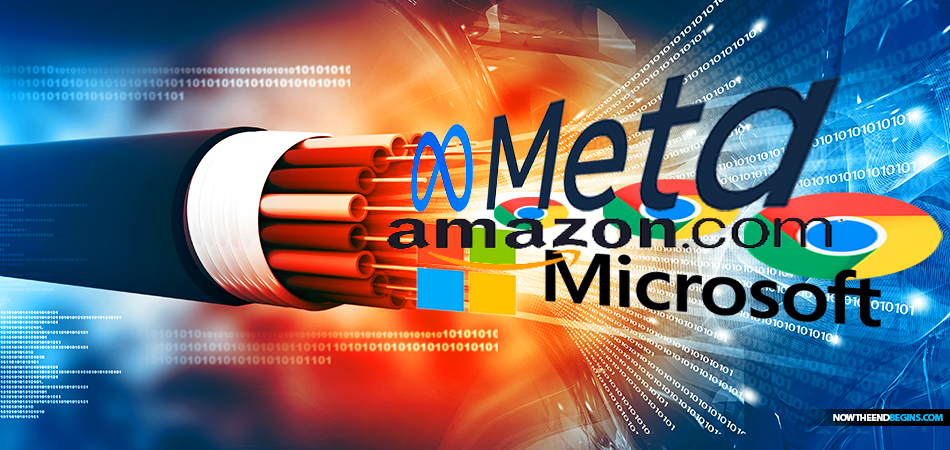
In less than a decade, four tech giants— Microsoft, Google parent Alphabet, Meta (formerly Facebook ) and Amazon —have become by far the dominant users of undersea-cable capacity. By 2024, they will own most of it.
The world is literally controlled by Silicon Valley tech tyrants on a level that General Motors didn't even dream about, GM only dominated the automobile business, they didn't control the whole world. But Amazon, Google, Meta and Microsoft are very close to having their greedy, filthy hands on all of it, and when they do, there'll be no escaping their grasp. It's these same people who are right now trying to push you into a Metaverse you'll never get out of. This is not a rise in technology or advancement in innovation, this is the rise of the spirit of Antichrist.
"For we wrestle not against flesh and blood, but against principalities, against powers, against the rulers of the darkness of this world, against spiritual wickedness in high places. Wherefore take unto you the whole armour of God, that ye may be able to withstand in the evil day, and having done all, to stand." Ephesians 6:12,13 (KJB)
As the tech tyrants gain more power, you have watched the dramatic rise in censorship and cancel culture, a 21st century version of Hitler's book burning parties at the local volksbücherei, or public library. Have you ever asked yourself about why everything is being connecting digitally? On the Friday Prophecy News Podcast, we told you about something called the "internet of bodies", hope you paid attention because that's what they're building right now. And they're using your body to do it.
Google, Amazon, Meta and Microsoft Weave a Fiber-Optic Web of Power
FROM THE WALL STREET JOURNAL: Fiber-optic cable, which carries 95% of the world’s international internet traffic, links up pretty much all of the world’s data centers, those vast server warehouses where the computing happens that transforms all those 1s and 0s into our experience of the internet.
Where those fiber-optic connections link up countries across the oceans, they consist almost entirely of cables running underwater—some 1.3 million kilometers (or more than 800,000 miles) of bundled glass threads that make up the actual, physical international internet. And until recently, the overwhelming majority of the undersea fiber-optic cable being installed was controlled and used by telecommunications companies and governments. Today, that’s no longer the case.
In less than a decade, four tech giants— Microsoft, Google parent Alphabet, Meta (formerly Facebook ) and Amazon —have become by far the dominant users of undersea-cable capacity. Before 2012, the share of the world’s undersea fiber-optic capacity being used by those companies was less than 10%. Today, that figure is about 66%.
And these four are just getting started, say analysts, submarine cable engineers and the companies themselves. In the next three years, they are on track to become primary financiers and owners of the web of undersea internet cables connecting the richest and most bandwidth-hungry countries on the shores of both the Atlantic and the Pacific, according to subsea cable analysis firm TeleGeography.
By 2024, the four are projected to collectively have an ownership stake in more than 30 long-distance undersea cables, each up to thousands of miles long, connecting every continent on the globe save Antarctica. In 2010, these companies had an ownership stake in only one such cable—the Unity cable partly owned by Google, connecting Japan and the U.S. Traditional telecom companies have responded with suspicion and even hostility to tech companies’ increasingly rapacious demand for the world’s bandwidth. Industry analysts have raised concerns about whether we want the world’s most powerful providers of internet services and marketplaces to also own the infrastructure on which they are all delivered. This concern is understandable. Imagine if Amazon owned the roads on which it delivers packages. READ MORE
No comments:
Post a Comment